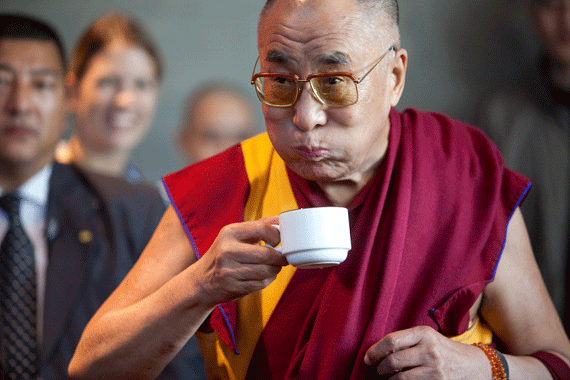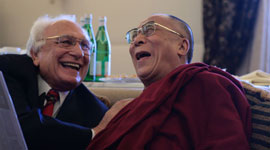
According to the Dalai Lama’s autobiography, Mao Zedong, the founder of the Chinese Communist Party (CCP), once characterized religion as “poison.” The modern CCP maintains official atheism to this day, but that hasn’t stopped officials from claiming control over the intricacies of Tibetan Buddhist reincarnation.
Angered by recent comments by the 14th Dalai Lama, 79, that he might not have a successor, Chinese officials have lashed out at the exiled spiritual leader and reasserted long-standing policies that grant them control over the recognition of reincarnate lamas.
“It’s none of their business,” Tenzin Dolkar, executive director of the New York–based Students for a Free Tibet, said in a statement to Tricycle. “The Chinese government needs first and foremost to prioritize addressing the grievances of the Tibetan people which have led to at least 137 self-immolations in Tibet, end its repressive policies, respect the rights of the Tibetan people, and end its illegal colonial occupation of Tibet.”
The overwhelming majority of last words or written statements by Tibetans who have self-immolated since 2009 have called for the Dalai Lama’s return to Tibet or included wishes for his long life. But the current Dalai Lama’s popularity inside Tibet has not kept CCP officials from taking a hardline position on the man they consider to be a dangerous separatist.
That hard line extends into the afterlife.
“Whether we’re talking about the Dalai Lama’s reincarnation or the continuation of his lineage, accepting or rejecting it is in the hands of the Chinese government—not other people, and certainly not the Dalai Lama himself,” Zhu Weiqun, who heads the Chinese government committee that handles ethnic and political affairs, told reporters earlier this month.
Zhu went on to accuse the Dalai Lama of adjusting his public statements about his future reincarnation based on donations and of using his religious title as “a lever, a tool of separatist doctrine.” Padma Choling, the appointed governor of the Tibetan Autonomous Region, made similar comments a day earlier.
Those comments came on the heels of separate interviews by the BBC and Die Welt late last year in which the Dalai Lama commented that it might be best to end the institution, which began with Gedun Drup in the 15th century, while it is still in good repute.
“This man-made institution will cease. There’s no guarantee that some stupid Dalai Lama [won’t] come along that disgraces himself or herself. That’s very sad. So [it’s] much better that the centuries-old tradition cease at the time of a quite popular Dalai Lama,” he told the BBC, before breaking into laughter.
The aging leader also made some serious points, telling Die Welt that since he devolved his political authority to an elected government in 2011, the institution of the Dalai Lama may have “had its day.” In the end, he told the BBC, the institution’s future will be up to the Tibetan people.
Yet China has long claimed authority over the reincarnation process. In the 18th century, the Qing Emperor imposed a system for confirming Tibetan reincarnations by lottery, which was then only used a handful of times. In 1995, however, Chinese officials revived the system to install their own candidate as the 11th Panchen Lama, detaining a young boy whom the Dalai Lama had recognized. His whereabouts remain unknown.
Reincarnation has reemerged as a political issue with the approach of the Dalai Lama’s 80th birthday next July and his recent comments about his successor.
“Zhu Weiqun’s comments represent the strong opinions of the majority of upper-level Party officials,” Tsering Woeser, a Tibetan writer and journalist who lives in Beijing, told Tricycle in an online message. “They have the brutality of the Cultural Revolution, the Red Guard, and the Kuomintang behind them—domineering, dumb attitudes. So, it’s futile to consider the issue of Tibet or whether His Holiness the Dalai Lama will or will not return to Tibet under such power grabbers. . . . This proves once again that the CCP lacks sincerity and has no plans whatsoever to work with the Tibetan people to address what they’re hoping for with regard to the Tibet issue.”
The matter of whether or not it is possible to negotiate with the Chinese government in good faith is controversial within the Tibetan community, with some arguing for the necessity of nonviolent protests to pressure the Chinese government into negotiations and others arguing for an exclusively diplomatic approach.
Recent comments by Zhu, Padma Choling, and other Chinese officials are likely to aggravate that disagreement, which is tied up in larger questions of whether Tibetans should seek full independence or simply greater autonomy within China. The Dalai Lama and the Central Tibetan Administration adopted a policy of seeking autonomy rather than independence around 1974.
“The Chinese leadership are pragmatic,” said Kaydor Aukatsang, the Dalai Lama’s representative to the Americas. “They know they will never find someone more moderate or easier to deal with than the current Dalai Lama. . . . So while His Holiness is still healthy and active, the Chinese government should seriously reevaluate their positions and seriously consider reaching out to His Holiness.”
More at Tricycle:
|
BLOG: THE END OF THE DALAI LAMA? |
BLOG: STEPHEN COLBERT: THE 15TH DALAI LAMA? |
Thank you for subscribing to Tricycle! As a nonprofit, we depend on readers like you to keep Buddhist teachings and practices widely available.

